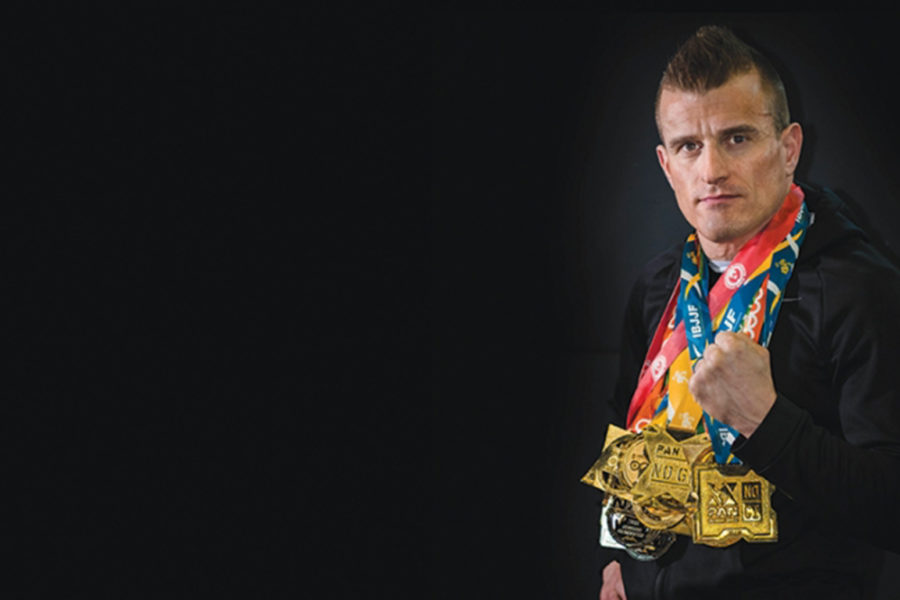
Robert “Cozmo’’ Consulmagno set a world record, which will soon be in the Guinness Book of Records, Dec. 20, 2016, when he performed 524 standing ab-wheel rollouts in 60 minutes. That world record isn’t just part of Cozmo’s story. It’s actually the ending.
The story begins in Jersey City, NJ in 1972 when his mother, a 16-year-old child at the time, got pregnant for the second time in just over two years. The baby of a baby, Robert, has only brief memories of his biological father, Michael, who hung himself when Robert was just 10 years old.
“I remember seeing him once or twice,’’ he says. “They say (the suicide) was a combination of his schizophrenia and the fact that he was living down the street from us and couldn’t handle what was happening.’’
What happened was Robert’s mother left Michael for Phillip, who he refers to as “his stepfather’’ and the man who raised him from the time he was 5 years old until he also committed suicide seven years later.
Phillip was very respected in the neighborhoods of Jersey City and was friends with some very influential people that allowed him to take Robert to Mets’ games, and Jets’ games and Rangers’ games where they would have primo seats and at times, would meet the players and get their autographs after the games.
“There was a good side to him,’’ Cozmo says of Phillip. “And as a kid, you’re like a puppy, you love that affection. He would come to my Little League games and cheer me on, but if a call went against me, he would go crazy on the umpire. And I still remember, I had a New York Daily News paper route and he would help me with it every Sunday. He would drive me around in that big Pontiac Bonneville he had, the same car where he eventually shot himself.’’
Phillip’s bad side was more than just yelling at umpires after bad calls. And it’s what Robert remembers much too much. When one of his teams would lose, or if something went wrong at his work, Robert and his mother would pay.
“He beat my mother all the time,’’ Robert said. “He beat his own mother.’’
And he beat Robert.
“One time, he kind of chicken-winged my right arm and broke it,’’ he said. “Another time he knocked me down the stairs and put me in a body cast. He told my mother I fell.’’
There was also the time Robert witnessed Phillip beating a man to near death on the street over a parking spot. The cops showed up, took the body away and let Phillip walk away. Yes, he was very well respected.
“I never understood what he did or why he did it,’’ Robert says “I still don’t.’’
Robert didn’t know what to expect on a cold, bitter New Jersey night in December of 1984 when he was 12 years old and his mother woke him up in the middle of the night.

Robert “Cozmo’’ Consulmagno
“It was really cold that night, freezing cold and my mother comes in my room and says, ‘c’mon let’s go’ and gives me a kiss. She had packed some stuff up. I’m still in my pajamas and we go outside and there’s a van there. I didn’t know what was going on at the time.’’
The van belonged to Chuck, Robert’s mother’s new boyfriend. After years of abuse from Phillip she finally got the courage to leave. And she did so in the middle of one of the coldest nights of the year.
“The van wasn’t even running. Chuck and another guy were pushing it,’’ Robert said. “We didn’t want to wake up Phillip. I remember I got in the back. We started driving and the next thing I knew we were in Newburgh, New York at the Hidden View Trailer Park.’’
It got worse from there.
Phillip, incensed over the family’s departure, tracked Chuck down. They knew each other from the old neighborhood and actually worked on the same block. When he found him, Phillip pulled out his .22, the same one Robert remembers him letting him hold, and shot Chuck in the head. He thought he killed him, but the bullet somehow managed not to go all the way through and Chuck survived. Phillip didn’t. Later that night he was found in Moonachie, New Jersey, dead in his Bonneville, with the engine on fire and a bullet wound to his head.
“Chuck said he saw him and said, ‘If I can’t have Dottie, no one can have her.’ Then, I guess he killed himself, too,’’ Robert remembered.
At 12 years old, he had a father and a stepfather commit suicide and another “father figure’’ get shot in the head.
“My life sucked, right?’’ he says now. “You know it sounds strange, but even though Phillip beat us, I liked him. It’s like the battered-woman syndrome. I actually wrote Phillip a letter after we left and told him I missed him. I gave it to Charles to give to him, but he threw it away. And then laughed at me.’’
Robert, a city kid, didn’t like the trailer park life in Newburgh and moved back to Jersey City. He lived with Phillip’s mother and finished school at Dickinson High School, which sat right across the river from the World Trade Center. Upon his graduation, which he skipped, he joined the Marines.
“I wanted to be somebody and I wanted to just get away,’’ Robert said. “I actually wanted to be a Navy Seal, but I was just a basic swimmer.’’
 Robert laughs at his own joke. Now, 44 years old he laughs a lot. After all he’s been through, life is finally good. He’s finally enjoying himself. He’s happy. He’s setting World Records.
Robert laughs at his own joke. Now, 44 years old he laughs a lot. After all he’s been through, life is finally good. He’s finally enjoying himself. He’s happy. He’s setting World Records.
It started when he joined the corp.
“The Marines was a good thing for me, but I was fighting all the time,’’ he says and again laughs. “As tough as people say the Marines are, and they are, it was easy for me. I’m not sure why, but it just was. They called me a rock and they tried to break me. But I never broke. I got in a lot of trouble, but I never broke.’’
It was during his five-year stint that took him from Paris Island to Japan to Tennessee and finally, North Carolina where Robert was diagnosed with Bi-polar Disorder One and Post Traumatic Stress Disorder (PTSD).
“I denied it at first,’’ he said. “I would go see the doctor, and then rip up the paper work. I’d get back to the base and they would ask me what happened and I would say, ‘They told me to get back to work.’ Yeah, I screwed myself.’’
After his discharge, and with the persistence of the Disabled American Veterans (DAV), Robert finally got the help he needed to battle his afflictions. It didn’t come through the prescribed medicine, however.
“They gave me medicine, but it just didn’t make me feel right,’’ he said. “I didn’t want to be on medicine. I needed to find my own high.’’
So he prescribed his own solution. After going back to college at William Paterson in New Jersey, selling stereo equipment for Tweeter, reuniting with some old Marine buddies and traveling the country, he found Mixed Martial Arts was the answer.
“I met a guy in St. Louis who was trainer for the MMA,’’ he recalled. “That’s what I needed. When I’m manic, I go to the gym, and I’m a machine.’’
Inspired when he found out his great grandfather, Michael Consulmagno, aka Mickey Taylor, is in the Boxing Hall of Fame, there was no stopping Robert from his new goals.
His first dive into the field was in the area of International Brazilian Ju-Jitsu and he rose to be the world’s No. 1 ranked man in his age bracket. When he stopped in 2016, he was ranked No. 2 in the world.
“I needed a break,’’ he said. “I wanted to do other things. If I had known sooner about my great-grandfather, I probably would have been a boxer.’’
As he rose to the top of his field, “Cozmo’’ decided to help others afflicted with the same diseases and troubles he faced in his life, and has begun another career as a keynote speaker for Bi-Polar disease and PTSD.
“All I want to do,’’ he says, “is help protect people and save lives.
“What I tell people is you have to find something, you need to do what you do best. For me it was working out. For someone else it could be playing chess, or art, or anything. It doesn’t matter what it is, you have to attack it.
“You have to use your PTSD to push yourself, you need to attack your fear. I like to use the Batman quote, ‘Make your worst fear your ally.’’’
Robert “Cozmo’’ Consulmagno has done just that, and on Dec. 20, 2016 at the DAV headquarters in Washington D.C., he set a world record.

